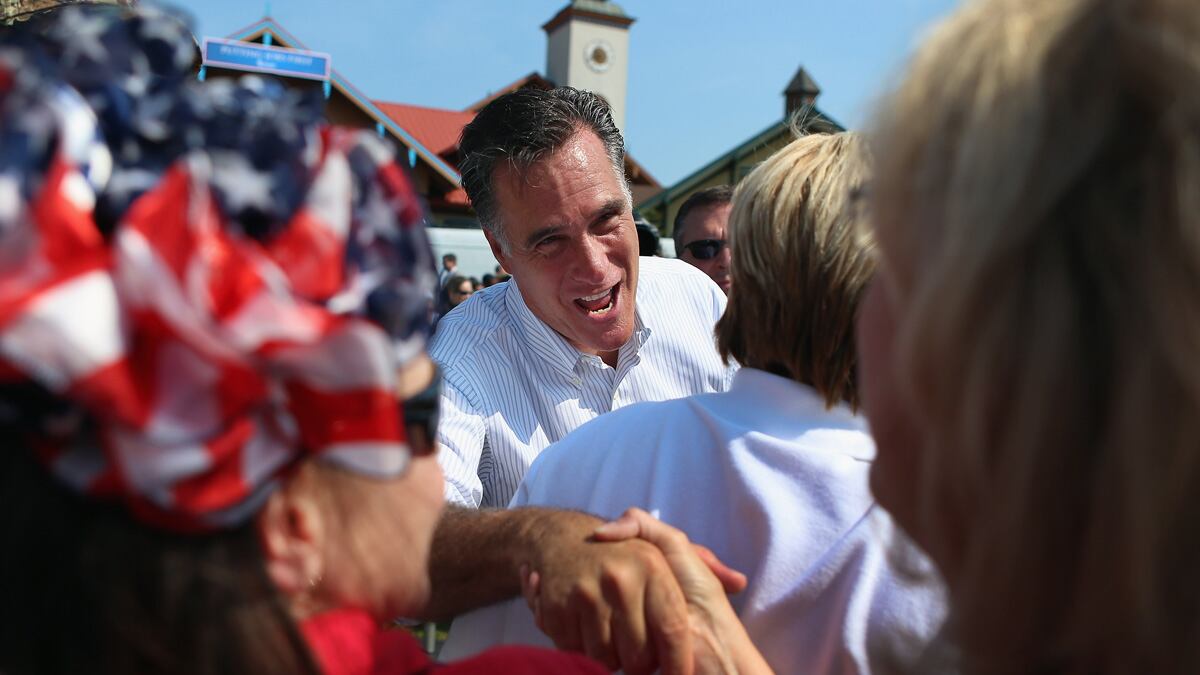Jenny Craig (entrepreneur ) has given more than $50,000 to Republicans in this election cycle. Jenny Craig does not seem thrilled about it.

The former refers to Jenny Craig, a Louisiana-born thoroughbred racing enthusiast and weight-loss guru, who recently hosted a fundraiser for Republican presidential candidate Mitt Romney at her California mansion. In the past year, Craig has given $30,800 to the Republican National Committee, $2,000 to the Campaign to Defeat Barack Obama, $1,000 apiece to Michele Bachmann and Scott Brown, and $2,500 to Romney, according to OpenSecrets.org, a campaign–finance tracking site. She is one of Romney’s top bundlers, committed to bringing in as much as $250,000 for his campaign.
The latter is Jenny Craig Inc., the apolitical California-based weight-loss empire founded in 1983 by Craig and her husband and sold to Nestle Nutrition in 2006. “It’s important to note that Jenny Craig (the woman) has been retired for more than a decade, and is not involved in the company,” wrote a spokesman for the company in an email to The Daily Beast.
That delicate response points up the difficulties brands face in an election year. Political giving—through corporate donations or the individual actions of executives (and former executives)—can take a previously all-American brand and shade it red or blue, alienating or winning customers in the process. In a campaign charged by women’s issues, the consequences of political engagement are particularly significant for women’s brands. And with women, especially single women, shaping up to be a decisive voting bloc in this election, the allegiances of these companies and their executives count as significant endorsements for the candidates.
President Obama became the darling of the fashion set four years ago, luring many women’s brands, like Michael Kors and Ralph Lauren, into very public displays of affection. Where once it was the safer course to avoid discussing politics at Fashion Week or on Oprah Winfrey’s TV show, now support for the Obama campaign has become a selling point and an essential part of these brands’ identities.
“On the fundraising side, it has proven very successful, and it does create some good press for the president, especially as he’s trying to take a strong lead among women,” says Republican strategist Susan Del Percio. Obama has a 2-to-1 advantage among single women, according to a Quinnipiac University poll out in early July, and it can’t hurt that pretty much every hip designer on both coasts is making branded gear for his campaign.
They are also making bank for him. Vogue editor Anna Wintour is an Obama bundler, joining together with Sarah Jessica Parker to host a major fundraiser for the president at Parker’s West Village brownstone in June. Michael Kors has given nearly $95,000 in the last three election cycles, all to Democrats, according to the OpenSecrets database. Ralph Lauren has given more than $40,000 in the last three cycles, all to Democrats; nearly $35,000 just this year. Oscar de la Renta has given more than $30,000, all to Democrats.
Others have been more measured. Donna Karan has given $2,134 over the last three cycles, $1,000 went to the Democratic Party of Virginia and $1,134 went to Chellie Pingree, a Democratic representative from Maine. Robert Duffy, the chief executive officer of Marc Jacobs, gave $2,300 to Hillary Clinton in 2008 and $5,000 to the DNC in 2010.
Women’s lifestyle brands are also overwhelmingly in Obama’s camp. Lucille Roberts, founder of the Lucille Roberts gyms in New York, gave a total of $2,000 in political contributions before her death in 2003: half to Geraldine Ferraro, half to Frank Lautenberg, both Democrats. Rachel Ray gave $30,000 in the 2008 election cycle: $27,700 to the Democratic National Committee and the remainder to the Obama campaign. Oprah Winfrey, who just landed an interview with Romney, has given $30,800 to the DNC for the 2012 cycle and $5,000 directly to the Obama campaign—considerably more than the $2,300 she gave to Obama in 2007.
On the other side of the aisle, there are precious few like Jenny Craig, who are prominent donors to Republicans or Republican causes. Gary Heavin, president and CEO of the women-only Curves gym chain, has drawn attention for giving thousands of dollars to anti-abortion groups. His recent campaign contributions include some $17,000 to Republican candidates at the local level. In fashion, the ranks are especially thin. Nicole Miller gave approximately $2,000 to Rudy Giuliani in the late 1990s and designed a Giuliani scarf popular among members of his staff, but she’s given many more thousands to Democrats, including Al Franken, Hillary Clinton, and Barack Obama in the years since. Megawatt 1980s and 1990s designer Adrienne Vittadini gave $250 to the RNC in 2001.
“Businesses want to be all things to all people,” says Kathy Kiely, managing editor for the Sunlight Foundation’s reporting group, which monitors fundraising events for both parties. “They also want to have that influence. They want to play, but they don’t want their customers to get angry with them.”
Marketing experts say there is an added incentive for brands to be vocal about their politics: customers are coming to demand it. Says Derrick Daye, managing partner of the Blake Project, a marketing firm that consults with companies on these sorts of decisions: “There’s almost an expectation today that a brand is going to put a stake in the ground and stand for something.”






